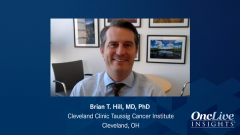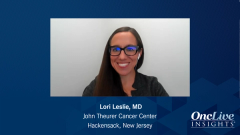
Assessing Response to Therapy and High-Risk Disease in Follicular Lymphoma
An expert’s perspective on assessing response to therapy in follicular lymphoma and the parameters used to identify high-risk disease.
Episodes in this series

Transcript:
Lori Leslie, MD: One of the challenges with treating patients with follicular lymphoma in the frontline setting is that we don’t have good predictive and prognostic models to help identify patients who are at increased risk of early chemoimmunotherapy failure. In general, when patients are treated with chemoimmunotherapy, once they relapse, the likelihood of a prolonged response to CIT [cancer immunotherapy] decreases. This is similar across many lymphoma subtypes. Typically, if patients are going to have chemoimmunotherapy in the frontline setting, what happens with their subsequent lines of therapy depends on their response to frontline, the duration of response, tolerability, and any other comorbidities that have accumulated between their frontline and later-line therapies.
The clinical factors that predict treatment response include what prior therapies they’ve received, if any; the duration of the prior remission; and the clinical presentation. Comorbidities and patient preference are also important because patients need to be comfortable with their treatment to be able to comply and receive the maximum benefit of being prescribed a certain treatment option. When we’re working out more about the molecular features that might help select treatment options and sequencing, that remains much less well-defined in follicular lymphoma than in, say, CLL [chronic lymphocytic leukemia], for example.
It’s challenging to define high-risk disease in the frontline setting, except for patients who present with transformation to diffuse large B-cell lymphoma, for example. In relapsed/refractory disease, patients who are high risk are usually those who have a relatively brief remission after their frontline therapy. This is commonly referred to as POD24, or progression of disease within 24 months of frontline chemoimmunotherapy. Other factors that may help identify someone who is at higher risk are age, because older patients may not tolerate the various treatment options as well; patients with uncontrolled comorbidities, which also represent a high-risk population—it’s harder to administer the various treatment options with those types of patients; and patients with an elevated LDH [lactate dehydrogenase] or those presenting more like a transformed disease with an elevated SUV [standardized uptake value] and a high Ki-67 on pathology. Even if we can’t document transformation to diffuse large B-cell lymphoma, those patients are at higher risk for having an aggressive course and are considered higher-risk follicular lymphoma.
In patients with advanced-stage follicular lymphoma, the younger they are, the longer they have to potentially relapse. About a fifth of patients will have that high risk of relapse, which is relapsing within 1 year of their up-front chemoimmunotherapy. With our treatment landscape, follicular lymphoma is still considered a chronic disease. Patients can relapse 2, 5, 10, even 20 years after their initial diagnosis. These patients require long-term monitoring, and typically I choose to use the word remission. For some patients, remission may be forever. For other patients, it may be relatively brief. Unfortunately, that’s relatively hard to predict on a patient-to-patient basis.
Transcript edited for clarity.






































